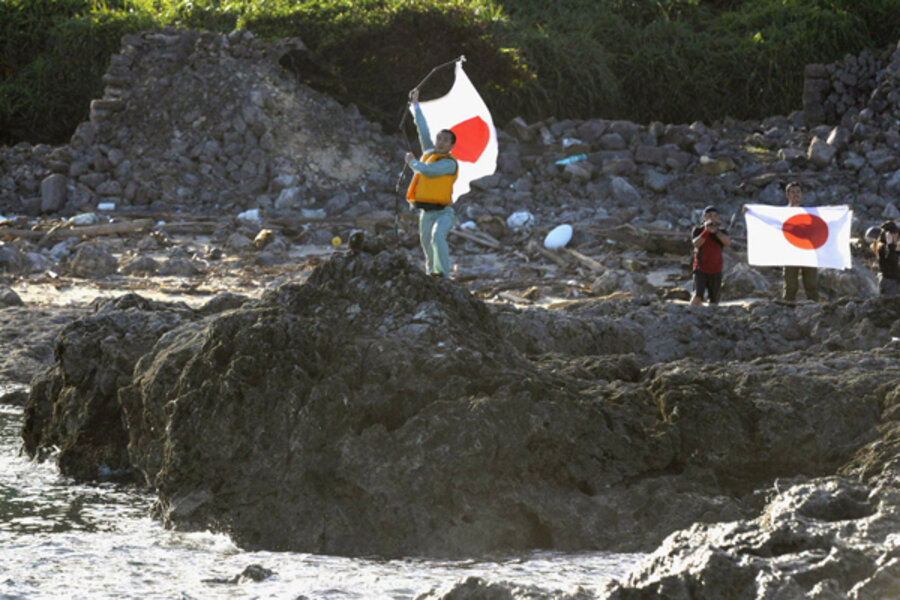Dip diplomacy: Japanese activists swim to disputed islands, raise flag
Loading...
| Senkaku Islands, Japan
Japan's territorial disputes with its neighbors flared anew Sunday as a group of nationalist activists swam ashore and raised flags on an island also claimed by China.
Chinese took to the streets in protest, overturning Japanese-branded cars and smashing windows at some Japanese-owned businesses, as Beijing lodged a formal complaint, urging Tokyo to prevent frictions from escalating further.
Ten Japanese made an unauthorized landing on Uotsuri, the largest in a small archipelago known in Japan as the Senkaku Islands and in China as the Diaoyu Islands. The uninhabited islands surrounded by rich fishing grounds are controlled by Japan but also claimed by China and Taiwan.
Of the 10 who visited the island, five were conservative local assembly members.
"The Senkakus are undoubtedly Japanese territory. It is to be expected that Japanese would take that to heart," said Eiji Kosaka, an assemblyman from Tokyo's Arakawa district.
China's Foreign Ministry protested, summoning Japan's ambassador to voice its complaints.
"The Japanese side should properly handle the current issue and avoid seriously damaging the overall situation of China-Japan relations," ministry spokesman Qin Gang said in a statement.
Tokyo rejected a complaint by China's ambassador to Japan, Cheng Yonghua, according to Japan's Foreign Ministry.
Vice Foreign Minister Kenichiro Sasae told Cheng in a phone conversation that the protests in China were "regrettable" and urged Chinese authorities to ensure the safety of tens of thousands of Japanese citizens there, the ministry said.
China's official Xinhua News Agency reported protests in cities across the country. Demonstrators burned Japanese flags, overturned or smashed Japanese cars, and in some places broke windows of Japan-related businesses.
Days earlier, a group of 14 Hong Kong residents and mainland Chinese traveled by boat to the islands, some swimming ashore. Protesters in Beijing, Hong Kong and other cities praised them as heroes and burned Japanese flags, but Japan arrested the 14 for landing without authorization.
On Friday, Tokyo deported the group, seeking to quiet the regional spat. But plans for further visits by activists on both sides appear likely to further inflame the territorial tensions.
Taiwanese Foreign Minister Timothy Yang summoned Japan's de facto ambassador to Taiwan, Sumio Tarui, on Sunday to lodge a protest over the visit by the Japanese activists to the islands, which are about 190 kilometers (120 miles) off Taiwan's northeastern coast.
Yang said the "provocative act" had heightened tensions in the area, according to a ministry statement.
The spat over long-contested territories comes as China's ruling Communist Party prepares for a major leadership transition. Leaders in both China and Japan face strong domestic pressure to defend national interests.
Frictions have also flared recently over another set of disputed islands, controlled by South Korea.
South Korean President Lee Myung-bak visited the islands in the Sea of Japan, called Takeshima in Japanese and Dokdo in Korean, earlier this month. His visit was seen by many as an attempt to play up anti-Japan sentiment ahead of elections later this year.
In the latest move to reinforce its territorial claim, South Korea unveiled Sunday a 47-inch-tall monument in the disputed islets, emblazoned in Korean with "Dokdo" in front, "Republic of Korea" on the back and President Lee Myung-bak's name on the side.
The Japanese group that landed on Uotsuri Island on Sunday was among dozens of conservative lawmakers and activists who were visiting waters off the disputed islands over the weekend.
"Four days ago there was an illegal landing of Chinese people on the island — as such we need to solidly reaffirm our own territory," said Koichi Mukoyama, a national lawmaker who was among seven conservative parliamentarians aboard a boat in the flotilla of some 20 vessels that traveled to the islands.
The lawmakers refrained from landing on Uotsuri after the government last week rejected their application to visit.
Last week's visit by the Chinese activists raised calls by critics of Prime Minister Yoshihiko Noda's government to take stronger action to protect the islands. Some lawmakers are urging that Japan's military be called on to protect the territory.
Japan says it has controlled the five main islands for more than 100 years. It has been trying to place four that are privately held under state ownership to bolster its territorial claim.
* Associated Press writer Elaine Kurtenbach in Tokyo contributed to this report.





